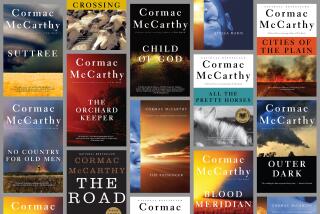Arrivals and departures
- Share via
Say the modern airport is really just a series of grievances. Repetitious tasks, confusing signage, a limited option of goods and services and little reward besides the opportunity to fly somewhere far away. Call it the intermediate malaise: You’ve started traveling, but you haven’t gotten anywhere yet. Bernard Share’s novel “Transit” brightens this dismal prospect with a journey that has very little to do with jet propulsion.
While changing planes in an unspecified Middle Eastern airport, two Irishmen of middle age have an accidental encounter in a men’s room. Think micturate and foot: “a stream of near unconsciousness, I’m afraid.” It’s a civilized enough exchange, considering the circumstances, and the two men -- who recognize each other, but from where? -- decide to have a drink while waiting for their connections.
So go the first dozen pages of “Transit,” and one could be forgiven for mistaking them as the beginnings of a witty espionage novel. Yet this theory falls apart all too soon when, after a few glasses of Tanzanian wine at the airport bar, the two men discover, in another men’s room, a doorway that leads directly back to mid-20th century Ireland.
Share is an Irish author and cultural historian with a flair for mischief, both narrative and lexicographic. His 1978 book, “The Emergency,” addressed Ireland’s neutrality during World War II, while “Slanguage” and “Dublinese” offer tours of the vagaries of English as It Is Spoke in Eire. Fitting then that most of the action in “Transit” takes place in and around the Dublin-moored campus of Trinity College, circa 1950.
With names that function like code words, the round and garrulous Rimmer (Mod. Lang.) and his companion, the affable A.N. Other (Classics), keep up a brainy, pun-laden patter as they try to make sense of why they’ve been returned to the alma mater of their past. “But Rimmer, as they walked out of the gate and turned right towards Tom Moore, was a stranger in a strange land,” Share writes. “Had he expected his own snail-trails, the dried slime of forty years, to be visible on the pitted surface of College Green?”
Coming and going from past to present and back to past -- most any bathroom stall in Dublin seems to work as a portal -- Share’s duo discovers that time itself is molding to the reach and fumble of their memory. Confronted with his youth, Rimmer considers how he could cast off age. “He wanted to slit his crumpled corporeal envelope across the date-stamp,” Share tells us, “to step out, wise head on supple shoulders, and enjoy the worst of both worlds.”
But only when he encounters his younger self deep in the throes of a love affair does Rimmer let his curiosity get the best of him.
In much the same way as the late Millard Kaufman, who wrote “Bowl of Cherries” with the advantage of advanced years and a thunderous sense of humor, Share reaches into the world of youth with old and clever hands. If only time were as malleable as memory imagines it to be. Yet unlike Share’s time-traveling duo, we never get a second chance. Time presses on, right alongside us, while we are making other plans.
More to Read
Sign up for The Wild
We’ll help you find the best places to hike, bike and run, as well as the perfect silent spots for meditation and yoga.
You may occasionally receive promotional content from the Los Angeles Times.






